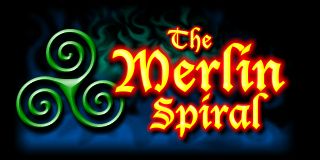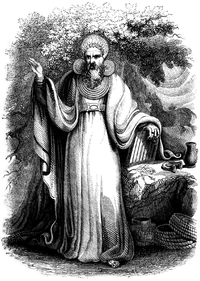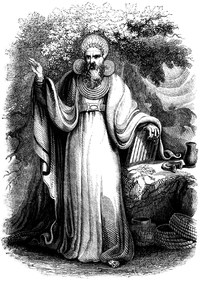Who Was Merlin? — Part 2
This post is Part 2 of a series. Click here to read “Who Was Merlin? — Part 1“.
So the question remains: Was Merlin a Druid?
That is an open question. Certainly he was a bard, and therefore the question can be worded like this:
How connected were the Bards to the Order Of Druids? For this we will look at both the ancient, middle ages, and modern evidence.
Ancient Evidence Of Druidism
Wikipedia has this to say:
Writers such as Diodorus Siculus and Strabo, with less firsthand experience than Caesar and relying on lost writings, wrote about the role of Druids in Gallic society. Diodorus divided the learned classes into bards, soothsayers and Druids, who he said were philosophers and theologians.
If this is true then this would indicate that the bards were part of the druidic order.
Evidence Of Druidism From The Middle Ages
Christianity came to the British Isles somewhere around the time of St. Patrick, possibly c. 450 AD. Certainly pockets of Christianity occurred prior to this date, but the change was not immediate. Ireland was first to be almost wholly converted, and then came Scotland and finally Britain.
This meant that major changes came to the island, and this caused conflict between the druids and the Christians as is attested through many stories and legends. Those druids that embraced Christianity continued in favor with the people and kings, while those that held to their pagan practices faded away. As part of this, the title “druid” disappeared and the more common “bard” or “shanachie” took its place.
Thus as Christians the influence of these bards continued for over a thousand more years, some say up until the 16th century.
St. Patrick even wrote down their laws for Ireland in the Senchas M#r (Christianizing where appropriate), and you can read these today in most U.S. law school libraries.
As their order waned, the bards and druids became more and more attached to chiefs and kings in dependence on them for support.
The problem with Merlin was that he lived during the time of transition to Christianity. Was he a Christain? Was he a druid? Did the Christian druids associate with the others or were they thrown out of the order?
We don’t know the answers to these questions, but Iolo Morganwg (a controversial figure and the founder of a branch of modern druidism) said the following in speculation about the early transition to Christianity:
The Bards believed that all things were tending to perfection; when, therefore, they embraced Christianity, they must on their own principles have viewed it as a stage in advance of their former creed. The more advanced in religious knowledge would, doubtless, recognize it in its true character, as the fulfilment of Druidism, that is, as far as the latter was identical with the patriarchal religion of Noah—as “the mystery which hath been hid from ages, and from generations, but now is made manifest to his saints; to whom God would make known what is the riches of the glory of this mystery among the Gentiles.” The Gospel of Christ is “the truth”—the realization of types and shadows; it is the “Truth against the world,” which Bardism was continually searching for.
The Gospel of Christ is the fulfillment of The Bardic calling of “Truth Against The World”. Very interesting! It is impossible to know whether his speculation is accurate, but from my own personal experience of my coming to Christ out of a non-Christian background, it feels right.
Modern Expressions Of Druidism
When we consider modern day druidism, we have different “camps” of druids:
- Those formed by Iolo Morganwg in the 1800s, the Gorseth of Wales, Brittany, and later the Gorseth of Cornwall.
- The neo-pagan Druids, founded in the 1960’s.
My own family has a personal connection to the first group, because my mother’s cousin, Phyllis Angove, was inducted into the order of the Gorseth Kernwow (the bards of Cornwall). This was in 1945, and she was thus honored because of her research into the history of Cornwall.
This first group technically does not consider itself “druids”. Here is what the Gorseth Kernow says about themselves:
The Gorsedd of Cornwall, or to give its Cornish language title, Gorseth Kernow, is an organisation dedicated to the preservation of Cornwall’s unique Celtic spirit, through literature, language, music and the arts, and the recognition of all forms of important service to Cornwall and its people. It is neither political nor religious, although some of its members are active in Cornish politics and church services in Cornish are held on special occasions throughout the year. It is allied to the Gorsedds of Wales and Brittany and has strong links with both these Celtic countries. It cannot be stressed too strongly that it has no connection whatsoever with Druidism nor with any pagan practice.
My opinion is that they are “winking” a bit here and only trying to distance themselves from the second group, the neo-pagans because they really are NOT about anything pagan in terms of worship. Their focus is on the arts, language, and history of the Celtic peoples, and are more of a cultural preservation society. The “wink” is because the Gorseth of Wales is less hesitant of calling themselves druids, and uses the three classes of druids (Ovates, Bards, and Druids) put forth by Diodorus and Strabo.
And despite the current website, their founder, Iolo Morganwg, attempted to make the order Christian. Here is his position on Christianity:
We, therefore, not only in virtue of our clerical office, but also as a Bard according to the privilege and usage of the Bards of the Isle of Britain, under the privilege of the Chair of Morganwg, embosoming the Chair of Baptism, beg to enter our most energetic protest (gwrthneu) against all attempts to impose upon any one as articles of belief the tenets of Bardism, where they are inconsistent with Christianity, as found in the Sacred Scriptures, and defined in the creeds of “the Holy Church throughout the world.”
In other words, no bard should be required to hold any belief of the druids unless it is consistent with the Bible.
So Who Was Merlin?
So, we have two possibilities for interpreting Merlin:
- He was a bard unconnected with Druidism.
- He was a bard as part of the Druidic order.
And we have two different types of Druidism:
- The older (and newer) Pagan variety.
- The Christian variety.
My own novel (Merlin’s Blade, volume 1 of The Merlin Spiral) is placed in 477 AD, and it is entirely possible that a person like Merlin during that era could have embraced Christianity.

So I have Merlin becoming a bard after he becomes a Christian, and being trained by the chief-bard who had left the pagan practices of Druidism behind.
This makes for a world in great turmoil, and allows me to deal deeply with issues of faith vs. culture that we deal with even today. How do you integrate these? We are so blind to the influence of our own culture that we often don’t see how it pulls and shapes us.
In ancient times, the druids were philosophers, judges, physicists, and doctors. Today we do not think it incompatible to be any of these “vocations” and still be a Christian. Likewise in the late iron age they did not think it incompatible to believe the (non-pagan) teachings of the druids and also be a Christian.
So in this sense, my Merlin can be taught by a Bard, yet not be a pagan druid.
Make sure you tune in for Part 3 — Was Merlin a contemporary of King Arthur?

